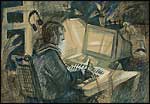People with this rare disorder engage in sexual activity while asleep, but don't remember it later.
By Anne Underwood
Newsweek
June 11, 2007 issue - When Jan Luedecke of Toronto was arrested and tried for sexual assault, he had an unusual defense—he did it in his sleep. Really. It may sound farfetched, but Luedecke, who was 33 at his 2005 trial, had a history of sleepwalking. On the night in question, he'd been drinking at a party and found himself sacked out on the couch with a woman he'd met there. Hours later, she jolted him awake and demanded to know what he was doing. Luedecke claimed he was unaware he was having sex with her. "Under the law, if there's no intent to commit a crime, you haven't committed a crime," says Dr. Colin Shapiro, director of the Youthdale Child and Adolescent Sleep Center in Toronto, who testified for the defense. Luedecke was acquitted (to the outrage of women's organizations in Canada), and the case is now on appeal.
Add sex to the roster of unlikely sleep behaviors known as parasomnias, which range from sleep driving to sleep eating. Last week psychiatrist Carlos Schenck and neurologist Mark Mahowald of the Minnesota Regional Sleep Disorders Center published a review article in the journal Sleep on what they call "sleepsex," or "sexsomnia." Think of it as a more advanced form of sleepwalking. It covers the full gamut of sexual activity, from fondling to intercourse, with one crucial difference. The patients apparently have no conscious awareness of what they're doing and, when wakened, have no recollection of it.
Is this for real? Reported cases are still rare—Schenck and Mahowald found only 31 in the medical literature. But they say that's partly because of the embarrassing nature of the problem and partly because there's so little public awareness of it. Sexsomnia was not even recognized by the American Academy of Sleep Medicine until 2005. Psychologist Michael Mangan at the University of New Hampshire, author of the 2001 book "Sleepsex: Uncovered," believes there are far more cases than the literature would indicate. He maintains a Web site on sleepsex that has registered comments from more than 1,000 sufferers.
Sleepsex is far different from your average sexual dream. Dreams occur during REM sleep, when the body is largely paralyzed. Sleepsex takes place during partial arousal from deep sleep, when one is free to move. Dreams can be remembered later, under the right circumstances. But sleepsex appears to belong to a mental netherworld in which brain regions devoted to higher thought, judgment and reasoning are shut down, while areas governing more primitive functions (such as locomotion, eating and sex) are still active. Put them together, and it can be a bad combination for someone who is already predisposed to sleepwalking or other parasomnias. For such a person, anything that induces more deep sleep—such as excessive alcohol consumption or persistent sleep deprivation—only increases the risk.
Granted, sleepsex sounds amusing—and some of the cases have their comical aspects. "One man had been initiating intercourse on almost a nightly basis," says Mangan. That was apparently fine with his wife, until "one night he started snoring." In another case, a female sexsomniac routinely groped her husband. Whenever he responded, says Schenck, "she would wake up and accuse him of forcing sex on her while she slept."
But doctors emphasize that sleepsex can lead to both physical and psychological damage. Bed partners have been known to suffer lacerations. (It's not uncommon, Schenck explains, for male sexsomniacs to display much rougher behavior during sleepsex than waking sex.) One man masturbated in his sleep with such energy that he suffered "repeated bruising of the penis" and avoided sexual intercourse for more than eight years. A man in Singapore masturbated in his sleep every night, leaving his wife feeling "cheated." "People experience real problems in relationships because of it," says Mangan.
Schenck and Mahowald hope that publicizing the existence of sexsomnia will cause more people to seek help. The condition is highly treatable with the generic anti-anxiety drug clonazepam. Seeking help can only work to a sufferer's advantage. After all, if you're going to have sex, you might as well enjoy it.
http://www.msnbc.msn.com/id/18999826/site/newsweek/

Thursday, June 7, 2007
It's Called 'Sexsomnia'
Posted by
Valery
at
5:53 PM
![]()
Subscribe to:
Post Comments (Atom)

No comments:
Post a Comment